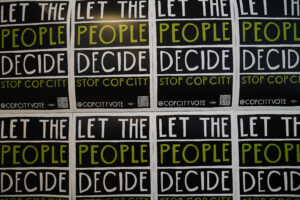Testing on Humans
Never mind, data is good, data is great. It can’t hurt to give the tests, right? Oh, but it can, it really can.
By Frank PepperEditor’s note: The author of this piece is an urban high school teacher who is writing under a pseudonym in order to protect the privacy of his students and his colleagues.
Today I attended and, yes, competed in an Easter egg hunt. Children, some as young as 4, were given a 60-second head start and guaranteed at least one candy-filled basket, but were otherwise seeking the same brightly painted hen ovum, as well as plastic oblong shells stuffed with $2 bills and golden Sacagawea dollar coins, hidden in a mossy wood.
Despite the rather fierce competition — this family awards formal “White Cane” awards to the least proficient hunters, even in the children’s division — at no time did I witness any cheating. In particular, I was watching for any parents or grandparents who might be slyly slipping the young ones an extra find or three.
But imagine this scenario: Before the hunt, these loving adults had been told that if their child took that year’s White Cane award, Child Protective Services would begin an investigation of their home care, as a first step to possible removal to foster care. Might they have been tempted to cheat then? Of course they would; no adult would have returned from the forest with anything, while their children’s bags would have been stuffed with loot. Their love for these young children would easily trump respect for rules, especially ones as arbitrary and oppressive as these.
Why, then, are we surprised that making standardized testing in the schools a high-stakes affair for adults and children is now proven to lead to wide-scale cheating?
Obviously, you may groan, taking a child from his or her family is an unfair analogy to what has transpired in Washington, D.C., Atlanta (where 35 educators last week were indicted on racketeering charges) and a clutch of other massive school districts since corporate-funded education reformers decided that what our system needed was a stiff dose of market-style incentive programs. And, duh.
However, the analogy is actually more accurate than it seems, which only teachers and school administrators are likely to grok. Here’s why.
Imagine you are a teacher at a school that serves primarily children from low-income families. Poor kids. Some are loved, some aren’t, some are well cared for, some aren’t, some are smart, some aren’t. The hard stats tell us, in no uncertain terms, however, that on average — and averages are cruel things — these children will have shorter and significantly more difficult lives than their peers in the middle and upper classes. More likely to be the victims of crime or themselves incarcerated, more likely to suffer from all manner of physical, mental and emotional ailments with severe consequences, more likely to end up homeless or as scarred war vets.
And you care about these kids, usually deeply. That’s why you are working there. Maybe you are young and have thrown yourself into this based on a moral imperative. Perhaps you are older, and more hardened, but have seen, many times over, the power that school has to save — or, yes, destroy — our most vulnerable. Or maybe you are the proverbial “burnt-out wreck” for whom the caring has become blurred by mental illness or resentment against the harms the system and, yes, the children have caused you.
Regardless, being a teacher in such a school, you would have to be a true sociopath not to care. And being human, you also probably care about yourself (although some teachers are guilty of not doing this enough). So when you are told, repeatedly and with increasing shrillness, that the test scores of these children will now be linked to far-reaching consequences, you pay attention.
Some teachers all the time, and probably all teachers some of the time, want to believe in testing. After all, we get into this affair because we want to help others learn and how sweet is it to be able to witness this learning made manifest, on paper, in hard numbers? And testing is an orderly affair, with neat rows of bubbles to fill, neat rows of heads bent over testing booklets — and many teachers are certainly fond of order.
Oh, but then here comes reality, messing up all that order. First, we find the tests are sloppy, odd things, full of dumb questions and skewed so heavily to the lower-order memorization skills that were never that cool to begin with and have become nigh irrelevant in a Google age. Questions asked in April are about things not taught until May; Eskimos are asked about mountain climbing and city kids are asked about skiing; and language learners take the same tests as native speakers. Furthermore, testing takes time — a lot of it. At many schools now, a sixth of the year is given to standardized tests: A couple of days of test-taking skills prep before, a couple of days of testing, a day to go over the test to see what went wrong, repeat every six weeks.
Never mind, data is good, data is great. It can’t hurt to give the tests, right? Oh, but it can, it really can.
Because, we are told, we will get less money if our students do not keep improving in their test taking. (This is almost never true, but is passed down from principal to teacher to student as if it came from Moses on the mountain and nobody ever questions it.) And we will also be assessing you as a teacher via your test scores, regardless of the fact that you don’t get to choose the standards (much less the kids) you teach, nor write the tests you give.
And finally, the biggie: If your students do not test well, we will huff, we will puff and we will blow your school down! Close it. Lock the doors. Send everybody elsewhere.
To society, closing a “dropout factory” or “failure factory” is a no-brainer. (Factories? Why always factories?) After all, we’ve seen the Hollywood movies — kids in the back of class sharpening their knives while a sad-sack teacher hides under a hail of spitballs. Why wouldn’t you want to close down that place?
And yet, whenever a “poorly performing” school is shut down, the whole community goes bananas: Students and parents and teachers marching picket lines, shouting at school boards, filing lawsuits. Why are they so upset? Didn’t they see the movies? We are doing them a favor. In the city where I teach, the closure of a handful of schools became the biggest font of organic political activism we’d seen in decades.
Because the adults know, and the children feel, that what they have is — while assuredly far, far from perfect — much better than nothing and better, even, than many of the alternative options that will follow: traveling farther to schools that may be better but also may, for that child or any child, be worse.
OK, so we now have multiple major motives to cheat on standardized tests: 1) Preventing school closures or budget cuts, which affect the children we care for. 2) Covering our adult asses to protect our pocketbooks and reputations. 3) Anger and frustration at what many perfectionist teachers consider lousy measures of learning, or actual detriments to it.
Holding the line against teachers’ cheating are two bulwarks: 1) Fear of getting caught. 2) Our morality.
In the wildly understaffed and undermanaged world of public education, where each administrator may have 40-50 adults reporting to him or her, getting caught is only an issue if you are stupid or grow astonishingly reckless and greedy, as in Atlanta. I could make all my students test a solid 30 percent better every time and I would bet my own children I’d never be caught.
So, morality. Teachers actually have a lot of this. Too much, sometimes, to be sure. Yet the overall message of the corporate education reform efforts, which no matter what they tell you have testing as their core tool, is that intentions — and therefore morality — do not matter. What matters are results. Results are hard to measure, except by tests. Therefore, we are stuck with all this testing.
So, the message, in fits and bursts, starts to get through: Results are more important than morality. And the results of this message are predictable: Morality erodes.
But then, maybe that’s only appropriate. We are becoming a nation of cheaters, and our public school system should probably reflect this.
Your support matters…Independent journalism is under threat and overshadowed by heavily funded mainstream media.
You can help level the playing field. Become a member.
Your tax-deductible contribution keeps us digging beneath the headlines to give you thought-provoking, investigative reporting and analysis that unearths what's really happening- without compromise.
Give today to support our courageous, independent journalists.






You need to be a supporter to comment.
There are currently no responses to this article.
Be the first to respond.